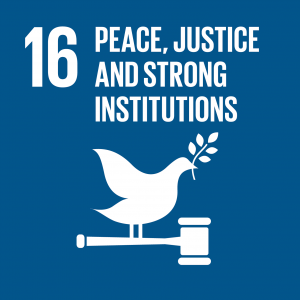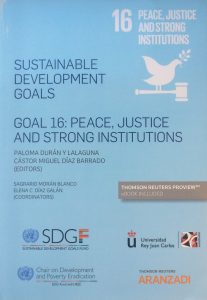The Sustainable Development Goals (SDGs) of the United Nations that came into effect in January 2016, are the most important goals that the world should work on for the future. These goals are the successor of the Millennium Goals. In the Sustainable Development Goals, the promotion of just, peaceful and inclusive societies was included a an essential goal for the future for the first time. This is SDG16. It is a goal that matches the ideal with which the Peace Palace was founded well! The Carnegie Foundation - Peace Palace signed the SDG Charter in September 2017. A year later, on 24 September 2018, the Peace Palace was appointed by the Ministry of Foreign Affairs of The Netherlands as official ‘SDG 16 House’, the first of its kind in the world.
The formulation of the 16th goal represents an expression of the steady enlargement and deepening of the concept of sustainable development since its apparition. To the primary aspects of sustainable use of resources and environmental protection had been added considerations of economic development but also some requirements regarding public participation, good governance and human rights. The call for the promotion of ‘just, peaceful and inclusive societies’ is the result of this necessary approach of sustainable development, and includes in the UN program voted in 2015 the following targets:
- 16.1 Significantly reduce all forms of violence and related death rates everywhere
- 16.2 End abuse, exploitation, trafficking and all forms of violence against and
- torture of children
- 16.3 Promote the rule of law at the national and international levels and ensure
- equal access to justice for all
- 16.4 By 2030, significantly reduce illicit financial and arms flows, strengthen the
- recovery and return of stolen assets and combat all forms of organized crime
- 16.5 Substantially reduce corruption and bribery in all their forms
- 16.6 Develop effective, accountable and transparent institutions at all levels
- 16.7 Ensure responsive, inclusive, participatory and representative decisionmaking
- at all levels
- 16.8 Broaden and strengthen the participation of developing countries in the
- institutions of global governance
- 16.9 By 2030, provide legal identity for all, including birth registration
- 16.10 Ensure public access to information and protect fundamental freedoms, in
- accordance with national legislation and international agreements
- 16.a Strengthen relevant national institutions, including through international
- cooperation, for building capacity at all levels, in particular in developing countries,
- to prevent violence and combat terrorism and crime
- 16.b Promote and enforce non-discriminatory laws and policies for sustainable
- development
Carnegie Foundation/Peace Palace and SDG16
The Carnegie Foundation signed the Sustainable Development Goals Charter in September 2017. By signing the charter, the organization commits to the promotion of these important development goals for the future that were set at the United Nations. Specifically, the Carnegie Foundation will focus on the goal to promote just, peaceful and inclusive societies, which is Sustainable Development Goal 16.
The Peace Palace has been founded as temple for peace and justice with the ideal that useful dialogue, mediation and an independent judiciary that can handle disputes between States can help to prevent war. The Peace Palace houses the International Court of Justice (ICJ), the Permanent Court of Arbitration (PCA) and The Hague Academy of International Law. The Carnegie Foundation is the owner of the Peace Palace, facilitates these important institutions and manages the Library! The Carnegie Foundation also has a role of active facilitator of dialogues and pursuant of progress towards peace.
Signing: and then?
By signing the Sustainable Development Goals Charter, the Carnegie Foundation – Peace Palace commits to the promotion of concrete progress towards peace. The Peace Palace is the worldwide symbol of peace and justice, but the Carnegie Foundation also strives to translate this grand ideal to concrete steps towards a more peaceful future. The organization does this by bringing together different parties for a constructive dialogue in a unique building that was founded as the temple of peace and justice.
SDG Charter organization
By signing the Charter, the Carnegie Foundation becomes a part of a network of organisations that have signed the SDG Charter. More information on the SDG Charter and the Dutch signatories can be found on the website of the Dutch SDG Charter.
SDG 16 House
As said before, Sustainable Development Goal 16 focusses on peace, justice and strong institutions. The Peace Palace, as an international symbol for peace and justice, has the aim to use this iconic value as convening power to bring together actors from different backgrounds for dialogues on contemporary issues in peacebuilding, to foster understanding and cooperation, leading to a more peaceful world. Therefore, the Ministry of Foreign Affairs of The Netherlands appointed the Peace Palace as official ‘SDG 16 House’, the first of its kind in the world. The launch of the SDG 16 House was performed by SDG Coordinator Hugo von Meijenfeldt of the Ministry of Foreign Affairs and Chairman Bernard Bot of the Carnegie Foundation on 24 September 2018, as part of the Carnegie Peacebuilding Conversations.
(editors Paloma Durán y Lalaguna, Cástor Miguel Díaz Barrado ; coordinators Sagrario Morán Blanco, Elena C. Díaz Galán)
The Chair on Development and Poverty Eradication aims at promoting the engagement of universities around the world towards the achievement of the 2030 Agenda for Sustainable Development through training, advocacy and research. It was established by the United Nations Sustainable Development Goals Fund (SDG-F). As part of the Chairs work, this book introduces a global vision of Goal 16. This Goal includes peace, access to justice and strong institutions as key elements to accomplish the 2030 Agenda. Authors have carried specific research studies on each of the subjects involved in Goal 16, which could be extremely useful to readers. The international community needs to make an authentic effort to achieve the SDGs. In order to accomplish this task, academic studies should play a key role. By researching and studying the SDGs, in all their different dimensions, academia can contribute to inform policy making for eradicating poverty and ensuring the welfare of everyone, leaving no one behind. These are the main purposes of this book. The analysis and recommendations of this report do not necessarily reflect the official views of the SDG Fund, the United Nations or its Member States.

